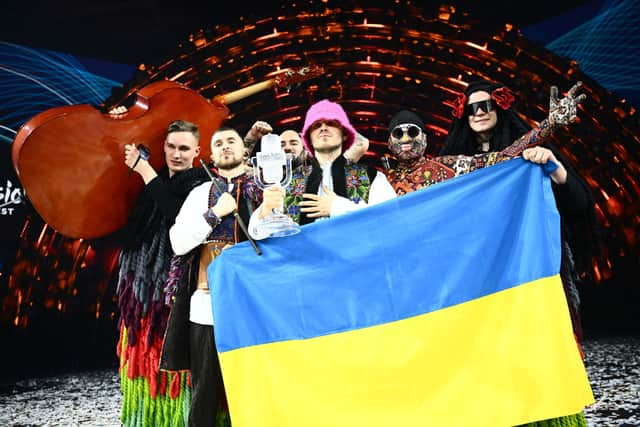Sam Ryder has taught the UK how to master Eurovision again - let’s not forget that
and live on Freeview channel 276
Any hope of a Eurovision win in the 21st century would have been laughed at only 12 months ago, but Sam Ryder has given us reason to hope again.
How many times before have we been told to get behind our entry, only to watch with a fake smile knowing that, at best, we “might get a point or two from Malta”?
Advertisement
Hide AdAdvertisement
Hide AdBut Sam’s intergalactic performance of ‘SPACE MAN’ took us all to the moon. It all came together on the night for him - the song, the voice, the guitar, the jumpsuit. It was a perfect Eurovision storm.


The collective confusion and/or excitement was palpable on social media as the points started to roll in. Eight points here, 10 points there. By the time the 12 points began coming in, I’m sure I wasn’t alone in shouting excitedly at the TV.
We even got 12 points from France and Germany, setting a new precedent for European relations (at least in Eurovision terms).
At the end of jury voting, the United Kingdom sat on top of the leaderboard with 283 points, up 283 points from last year. The dramatic final voting sequence ended with an enormous 466 points and a well-deserved silver medal podium finish. In any other year, the UK would now be busy making plans to host the next contest.
Advertisement
Hide AdAdvertisement
Hide AdWe were only beaten - rightfully so - by Ukraine. There’s no doubt that Ukraine deserved the win. It was a symbol of solidarity in Europe that was needed this year. It also didn’t hurt that the Kalush Orchestra’s ‘Stefania’ was a great song and performance, but there was also no doubt who would come out on top.


But for the UK, this feeling, which we haven’t had for at least 24 years, was unusual and should be celebrated - and it doesn’t have to be a one-off. Sam’s performance proves the doubters wrong. It isn’t all about politics, Europe doesn’t hate us for Brexit and they aren’t punishing us for it through a song contest.
Who would have thought putting a little bit of effort into the contest would reap the rewards?
After years of ailing former stars, middling pop songs and cringeworthy gimmicks, we have found the (almost) winning formula. When we put a good song in with great staging, we will get the votes.
Advertisement
Hide AdAdvertisement
Hide AdSam himself was seen in a video gushing about how the UK had finally “destroyed the stigma”. He knows, along with the British public, that our luck is finally turning in the competition.
Like a regretful ex begging to get back with their former partner, the UK is once again in love with Eurovision.
A peak audience of 10.6 million in the UK watched the 2022 contest on Saturday night. These numbers are unheard of outside of sporting events in the age of streaming, and only reaffirms the British appetite for the contest once again.
But we need to continue with the effort. One year of success isn’t enough to fan the flames. Case in point being Germany.
Advertisement
Hide AdAdvertisement
Hide AdIn 2010, German singer Lena hit the Eurovision stage in Oslo with her song ‘Satellite’. It was an instant Eurovision classic - a bubbly pop song that had a catchy hook and a great performance to match. She was rewarded with 246 points and took the trophy back to Germany for the first time since 1982.
Lena proved popular the next year again, placing 10th in the 2011 contest. But what followed was a grave decade for the country. Barring a very respectable fourth place finish in 2018, Germany seems to follow the UK’s formula of entering the blandest pop song you’ve ever heard, with the most forgettable staging of the night.


In the period between 2013 and 2022, Germany has had a total of three last place finishes and one ‘nul points’. Where did it all go wrong from the dizzying heights of Lena’s success?
The UK and Germany do have another thing in common. They are both ‘Big Five’ countries. Grouped into this category are the largest financial contributors to the European Broadcasting Union - the UK, Germany, Italy, France and Spain. The ‘Big Five’ are automatically given a grand final space and do not need to compete in the semi-finals, which perhaps explains the complacency. ‘Just send whatever, we’re in the final anyway.’
Advertisement
Hide AdAdvertisement
Hide AdThe Big Five generally do not have a great track record in the competition, with only Germany and Italy picking up wins from 2010 until 2022. The group regularly collects right-hand-side-of-the-board finishes, last place and even the dreaded ‘nul points’.
Compare this to habitual winners Sweden; they took the trophy home twice within the space of four years and rarely place outside the top ten in the modern era. The difference here being the immense effort Sweden puts into the competition each year.
As a self-confessed Eurovision superfan, I implore the BBC’s Eurovision delegation to use this as a cautionary tale. Please don’t let Sam Ryder’s amazing achievements go in vain. In a post-pandemic era, give us something to hope for once again, while you’ve still got the captive audience.
Comment Guidelines
National World encourages reader discussion on our stories. User feedback, insights and back-and-forth exchanges add a rich layer of context to reporting. Please review our Community Guidelines before commenting.
